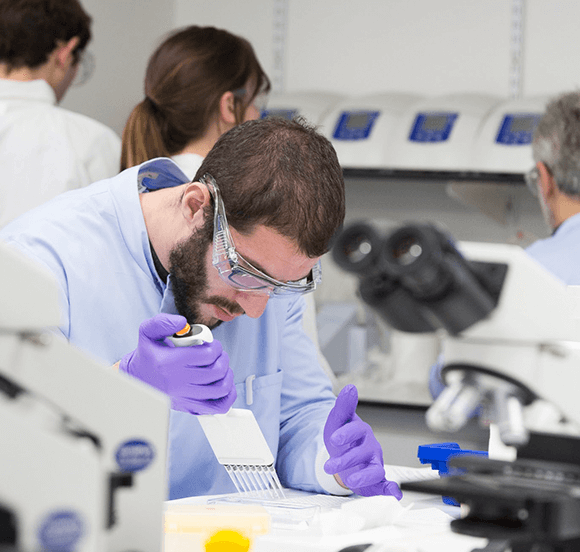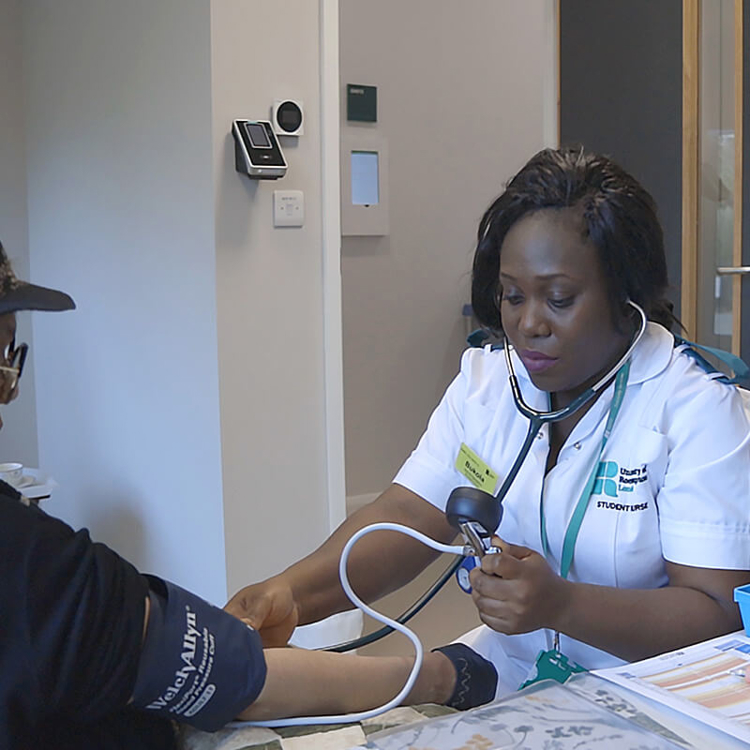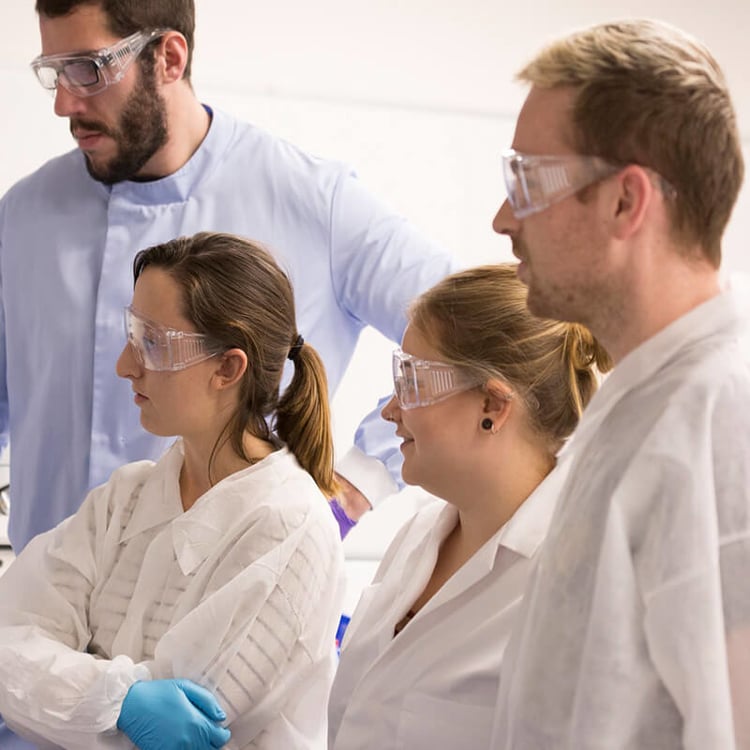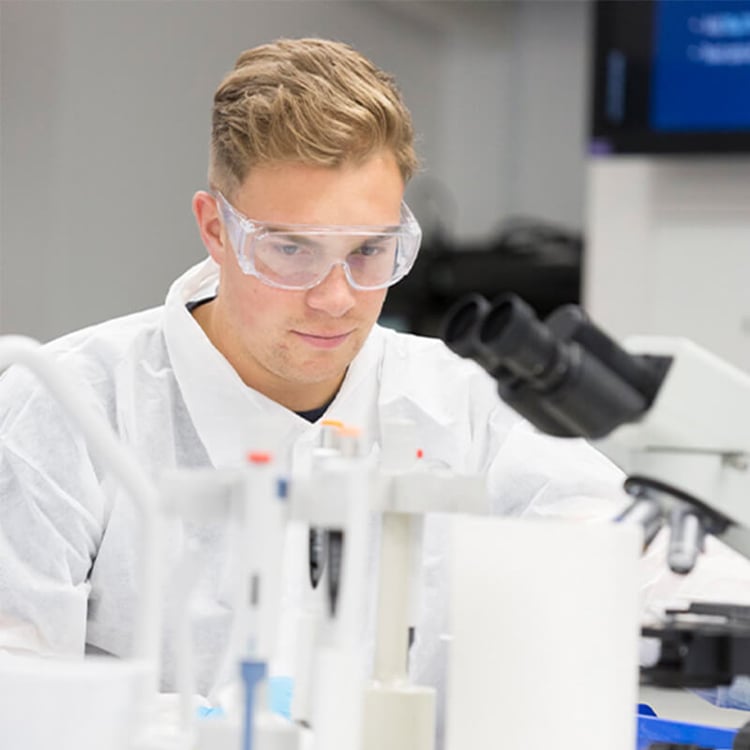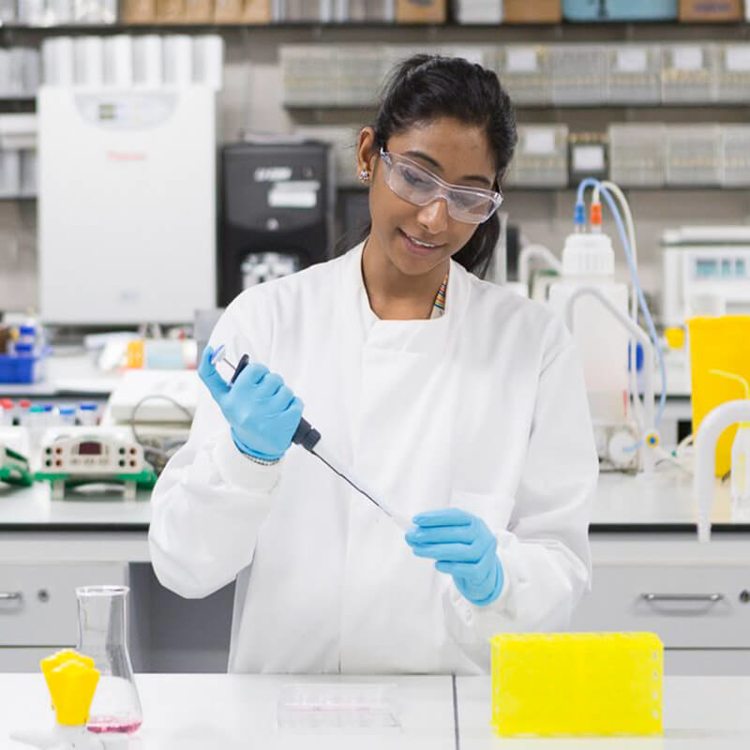You'll need:
2025/26 entry: Call 0300 303 8320 to find out if you are eligible for this programme in Clearing
UCAS Code:
B400
B401 (if choosing Foundation Year)
Start date(s):
September 2025
September 2026
Clearing
CLEARING 2025
Be Roehampton
Open for Clearing
Call us on 0300 303 8320Complete our Clearing self-application
Improving human health has never been a bigger global challenge. Get the specialist, practical skills you need to tackle topical issues and prevent disease through nutrition.
Did you know?
Our students and alumna have carried out a wide range of research in the field of nutrition. Read their blogs here.
This course is accredited by the Association for Nutrition, so once you graduate you can become a Registered Associate Nutritionist.

Top 6 in London for Nutrition and Health
(Complete University Guide 2023)

Top 3 modern university in London
(Complete University Guide 2025)

#1 modern university in the UK for Research
Research Excellence Framework
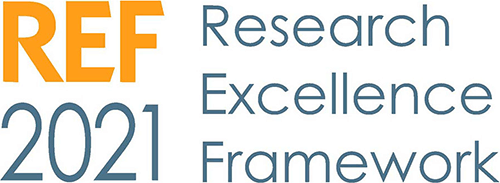
Foundation Year
This course can also be studied with a foundation year (September entry only).
Modules
You will build an understanding of research skills with a strong emphasis on evidence-based practice to support transformation in health and social care. Through interprofessional learning, you will explore the value of collaboration in healthcare research. The module also introduces digital healthcare innovations and examines the role of artificial intelligence in supporting research. This foundation will equip you to critically engage with research and apply evidence to improve practice across diverse care settings.
This module explores nutritional needs across the lifespan and populations, including athletes. It examines how factors such as age, gender, lifestyle, income and religion influence diet and food choices. The impact of growth and ageing on nutrient requirements are studied alongside methods for assessing nutritional status. Your new-gained knowledge will be applied to deliver tailored nutrition advice promoting health and wellbeing for all.
The Food Science and Sustainability module explores nutrient interactions, sustainable production, and the impact of food choices on health and the environment. It addresses food preservation, waste reduction, biodiversity, ethics, and regulations — preparing students to critically assess food systems and promote health, equity, and sustainability as future nutritionists.
This module explores the biology of cardiometabolic health, focusing on common health conditions such as obesity, diabetes and cardiovascular disease from a global perspective. It examines the role of diet, lifestyle and behaviour change in preventing and managing these health conditions. Practically, you will learn methods for assessment of body composition and energy balance to support health.
These modules are those we currently offer and may be subject to change.
This course offers all students the option of a one-year paid work placement, to boost your employability even further. If you choose this route, you will take the placement following year two of your course, and then return to complete your degree.
Why take a placement?
A placement year is the perfect opportunity to gain valuable work experience, to build on the career skills we will teach you on this degree. The connections you make on the placement will improve your career prospects further, and equip you with the skills you need to secure graduate-level employment.
How we support you
The University's Placement and Work Experience Team are experts at helping you to secure a placement. They will work closely with you from the start, helping you research potential employers, discover placement opportunities, create and pitch your CV, and will coach you to perform well in interviews. We aren't able to guarantee a placement, but our sector-leading advisors will give you the best possible chance of securing one.
Find out more about how we'll support you
We understand that your plans might change once you start your programme. If you decide not to do a placement, you will have the option of completing the three year version of your programme.
Whatever your choice, you will have access to many opportunities for work experience through our Placement and Work Experience Team, and access to face-to-face and 24/7 online careers support.
Throughout the module you are encouraged to contribute to discussions regarding current topics in clinical nutrition. These may include malnutrition, nutrition for dementia, dietary interventions for irritable bowel syndrome and diets with exclusions for food allergies. We have a future focused approach including the value of digital health technologies and environmental sustainability.
Prevention is better than a cure and working in health promotion and disease prevention provides many opportunities for a graduate. You will learn how we predict and control the spread of disease, promote healthy lifestyles and prevent disease. You will develop an understanding of global health issues, health promotion strategies, disease prevention, and professional ethics. In a rapidly changing world, public health has never been more relevant or more important.
You’ll gain invaluable vocational experience, with insights and understanding about graduate work associated with a Nutrition and Health. Undertaking a minimum of 50 hours professional experience, plus employers talks and job application workshops will give you a competitive edge transitioning into the world of work.
In this module, you will be acquiring an in-depth understanding of a focused area of research, completing a year-long investigative project with data collection. You will be deploying scientific techniques to research and analyse a nutritional topic, supported all the way by a supervisor with international expertise in the field.
These modules are those we currently offer and may be subject to change.
This course offers a foundation year, which takes place at the beginning of your studies. Studying a foundation year will give you academic and practical experience, and a strong introduction to your subject, ensuring you succeed on your undergraduate degree.
30 credits
You will develop your core academic and integrated English language skills of speaking, listening, reading and writing. You will become familiar with key academic skills and concepts, such as referencing methods and awareness of academic integrity and tone. You will apply these skills and knowledge to both broad topics and also your chosen subject pathway.
Teaching and learning
You will be required to actively engage in on-campus learning for up to 10 hours a week.
You will be taught through a full range of teaching and learning methods, which include lectures, seminars, workshops, discussion groups, group directed tasks and presentations. This will enable you to learn from your peers and tutors in both structured and information settings.
You will be encouraged to think creatively about your approach to learning and discussions with your peers. You will also have access to recordings, resources, links and signposting through Moodle to enrich your learning.
Assessment
You will be assessed through group and individual presentations, comparative and reflective essays, multiple choice exams, coursework and reports, oral exams, portfolios, case studies and blogs.
30 credits
You will develop your core academic and integrated English language skills of speaking, listening, reading and writing. You will become familiar with key academic skills and concepts, such as referencing methods and awareness of academic integrity and tone. You will apply these skills and knowledge to both broad topics and also your chosen subject pathway.
Teaching and Learning
You will be required to actively engage in on-campus learning for up to 10 hours a week.
You will be taught through a full range of teaching and learning methods, which include lectures, seminars, workshops, discussion groups, group directed tasks and presentations. This will enable you to learn from your peers and tutors in both structured and information settings.
You will be encouraged to think creatively about your approach to learning and discussions with your peers. You will also have access to recordings, resources, links and signposting through Moodle to enrich your learning.
Assessment
You will be assessed through group and individual presentations, comparative and reflective essays, multiple choice exams, coursework and reports, oral exams, portfolios, case studies and blogs.
30 credits
You will develop your research, numeracy and information technology skills. You will investigate the difference between primary and secondary research, conduct your own research project and demonstrate your findings through data analysis. You will also develop your awareness of equality, diversion and inclusion in the UK, through a real-world issue; discrimination in the workplace.
Teaching and learning
You will be required to actively engage in on-campus learning for up to 10 hours a week.
You will be taught through a full range of teaching and learning methods, which include lectures, seminars, workshops, discussion groups, group directed tasks and presentations. This will enable you to learn from your peers and tutors in both structured and information settings.
You will be encouraged to think creatively about your approach to learning and discussions with your peers. You will also have access to recordings, resources, links and signposting through Moodle to enrich your learning.
Assessment
You will be assessed through group and individual presentations, comparative and reflective essays, multiple choice exams, coursework and reports, oral exams, portfolios, case studies and blogs.
30 credits
This module provides you with a comprehensive introduction to the principles of human health, the mechanisms underlying diseases, and the tools used to study them.
This interdisciplinary module integrates knowledge of physiology, pathophysiology, epidemiology, and biostatistics to equip you with a well-rounded understanding of the factors that influence human health and the burden of disease.
The module explores health disparities and inequities across global populations, emphasising how factors like ethnicity, socio-economic status, gender, and geography influence health outcomes. You will analyse worldwide health statistics, such as life expectancy, infant mortality rates, and access to healthcare, to understand systemic inequalities. Case studies will focus on specific healthcare challenges, such as the unequal burden of non-communicable diseases (NCDs) in low- and middle-income countries, or disparities in vaccination rates across regions.
Sustainability is embedded by exploring the role of health systems in promoting long-term wellbeing and reducing environmental impacts. Topics such as the rise of sustainable healthcare practices, including reducing medical waste and using renewable resources in healthcare delivery, will be discussed. You will also reflect on how public health policies can contribute to sustainable development goals by promoting preventative care and addressing environmental factors that affect human health.
Global engagement is incorporated through an examination of how diseases and health interventions are influenced by global factors such as pandemics, climate change, and globalisation.
You will analyse global health policies, including the role of organisations like the WHO in managing health crises, and investigate variations in disease prevalence and healthcare access across different countries. Comparative research tasks will help you appreciate the global nature of health challenges and solutions, such as those experienced during the COVID pandemic.
Teaching and learning
Through a blend of lectures, practical sessions, and research-focused activities, you will explore the key physiological systems that maintain homeostasis, the causes and mechanisms of diseases, and the role of public health interventions.
The module will also introduce you to fundamental research methodologies and statistical analysis, emphasizing the importance of data-driven decision-making in health sciences.
The teaching delivery for each module consists of one, one-three-hour lecture and one, two-hour seminar per week. Lectures will cover core indicative content, while seminars will consist of research workshops, small group learning on relevant case studies and practical lab sessions.
You will also have an additional 30 minutes of online support each week, which will consist of formal preparation/review of lab sessions, or exam preparation (e.g. quizzes).
Assessment
This module will be assessed using an infographic and a data analysis report.
50% - infographic, you will design an engaging and evidence-based infographic that communicates a key public health message to a target audience.
50% - data analysis report, you will be required to complete a structured data analysis report based on the analysis of a provided dataset related to a public health issue.
30 credits
This module provides you with an integrated exploration of human physiology and nutrition, offering a comprehensive understanding of how the human body functions and the critical role of nutrition in supporting health and wellbeing. It examines the interplay between physiological processes and nutritional requirements, highlighting their importance in maintaining homeostasis, supporting growth, and optimizing performance.
The module begins with foundational topics, such as cellular structure, tissue types, and the anatomy and physiology of key systems, including the digestive, cardiovascular, and respiratory systems. You will then delve into the principles of energy balance, metabolism, and hormonal regulation, exploring the roles of macronutrients, vitamins, and minerals in human health.
Other key topics include fluid and electrolyte balance, the relationship between nutrition and immune function, and the nutritional demands of exercise and physical activity.
By the end of the module, you will be equipped with the foundational knowledge and practical skills necessary to apply physiological and nutritional principles to health promotion, disease prevention, and performance optimisation.
Teaching and learning
Through a combination of lectures, practical sessions, and discussions, you will develop the ability to critically analyse the integration of physiology and nutrition in promoting health. You will also gain insight into the consequences of imbalances, such as nutrient deficiencies, metabolic disorders, and the impact of malnutrition on the immune system.
The teaching delivery for each module consists of one, one-three-hour lecture and one, two-hour seminar per week. Lectures will cover core indicative content, while seminars will consist of research workshops, small group learning on relevant case studies and practical lab sessions.
You will also have an additional 30 minutes of online support each week, which will consist of formal preparation/review of lab sessions, or exam preparation (e.g. quizzes).
Assessment
This module will be assessed using an open book exam and a case study report.
50% - open book multiple choice exam, consisting of 30 questions.
50% - case study report, that explores the interaction between a physiological system and nutrition in maintaining health or contributing to disease.
These are the current planned modules on this course and may be subject to change.
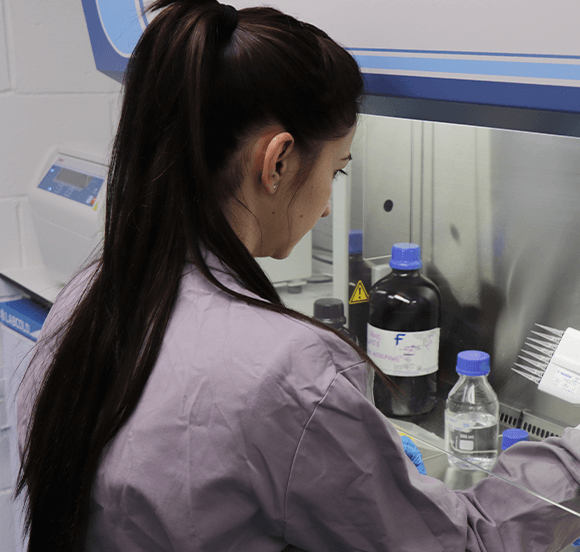
Skills
Make a difference to human lives with a degree in nutrition and health.
Accredited by the Association for Nutrition, this course gives you the knowledge and skills to carve out a sustainable career in the health sector.
You’ll gain a strong foundation in the science behind good nutrition, disease, treatment, and prevention.
Along with practical laboratory skills (analytical and qualitative), you’ll develop the attributes you need to succeed in the workplace, including:
- Written and spoken communication
- Problem-solving
- Critical thinking
- Teamwork
- Attention to detail.
You’ll also gain an understanding of the ethics and best practice involved in working with clients.
Your employability is our priority from day one. An optional paid work placement gives you the opportunity to gain professional experience, or study abroad between Years 2 and 3.
When you graduate, you'll have the chance to become a Registered Associate Nutritionist and help others lead healthy lives.
During your time with us, you'll explore:
- Principles of human nutrition
- Awareness of public health
- Research and analysis, and how to effectively communicate
- Practical laboratory skills, including food analysis and evaluation
You’ll work on core subjects within nutrition and have the opportunity to shape your degree around your interests and ambitions.
Learning
Experience a dynamic, contemporary curriculum in state-of-the-art facilities.
This programme blends scientific knowledge with practical applications, preparing you for real-world challenges.
You'll explore key topics such as nutrition for different population groups, food science and sustainability, public health and psychology for nutrition and investigate the impact of diet and lifestyle in health and disease.
Learning takes place through a mix of lectures, practical activities, discussions, presentations, and teamwork. Critical thinking and the application of nutrition science in real-world contexts are central to our approach, ensuring you develop both theoretical understanding and practical skills.
You'll be taught by experienced professionals and researchers who are actively engaged in the fields of nutrition and health.You'll have access to cutting-edge facilities, including food laboratories, which are equipped for sensory analysis, tasting booths, microscopy and more.
Students will also have the opportunity to gain hands-on experience through placements, applying their knowledge in professional settings to enhance their skills and career prospects.
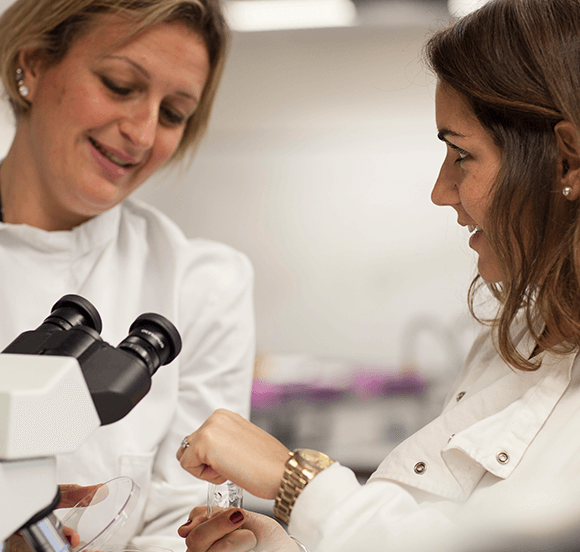
Assessment
Push yourself further with real-world assignments.
Throughout the course, you’ll experience a wide range of assessments that enhance your understanding and practical skills, while giving you a taste of professional practices. These include:
- online tests
- written examinations
- laboratory reports
- presentations
- essays
- portfolios
- practical assessments
- research and data collection projects.
You’ll leave Roehampton with an in-depth understanding of both the theory and the hands-on applications of nutrition and health, ready to take the next step.
Career
Shape the future of public health.
Our graduates go on to work in different specialisms within nutrition and health, such as:
- Clinical Nutrition/Dietitian
- Sports and Exercise Nutrition
- Eating Disorder Specialists
- Food Policy and Advocacy
If you’re ready to learn, we’ll help you gain the confidence and opportunities to achieve.

Other choose to explore a diverse range of roles, such as:
- Nutrition Researcher
- Weight Management Specialist
- Nutrition Educator
- Food Safety Specialist
- Food and Nutrition Consultant
- Community Nutritionist
- Public Health Nutritionist
With our BSc Nutrition and Health degree, you can also continue to postgraduate study – researching improvements to people’s health in the context of the malnutrition, obesity, injury, and chronic disease. Or taking courses that prepare you for patient-facing healthcare professions.
Our careers team is available to support you from the start of your studies until after you graduate. We will help you build your CV, prepare for interviews, and meet and learn from successful graduates working at the top of their careers. You’ll also have opportunities to work with our partners across London and beyond, and to attend a Roehampton jobs fair where you can find out about graduate opportunities and meet employers.
Open days
Get a real taste of our campus, community and what it’s like to study at Roehampton
Applying
Full-time UK undergraduate students apply through UCAS.
Entry tariff
2025/26 entry: Call 0300 303 8320 to find out if you are eligible for this programme in Clearing
Looking to work out your UCAS points or find out about our entry requirements? Find out more.
When we consider applications to study with us, we form a complete view of your achievements to date, and future potential, and can offer flexibility in entry requirements. Find out more about our Contextual Offer scheme.
Specific entry requirements
A-level / BTEC (or equivalent qualification) in a science subject or Home Economics (e.g. Food Nutrition & Health), Grade C.
GCSE (or equivalent) requirement: Maths, Grade C/4.
Contact us for further information.
General entry requirements
September 2025 entry tuition fees
UK (home) tuition fees
Undergraduate degree: £9,535
Foundation Year: £9,535
We offer a wide range of scholarships and bursaries. See our financial support pages for UK students.
We also provide other ways to support the cost of living, including free buses and on-campus car parking, hardship support and some of the most affordable student accommodation and catering in London. Find out more about how we can support you.
International undergraduate students apply through our direct application system.
Entry tariff
2025/26 entry: Call 0300 303 8320 to find out if you are eligible for this programme in Clearing
Looking to work out your UCAS points or find out about our entry requirements? Find out more.
When we consider applications to study with us, we form a complete view of your achievements to date, and future potential, and can offer flexibility in entry requirements. Find out more about our Contextual Offer scheme.
General entry requirements
September 2025 entry tuition fees
EU and international tuition fees
Undergraduate degree: £16,950
Foundation Year: £16,950
International Foundation Pathway: £16,950
We offer a wide range of scholarships and bursaries. See our financial support pages for international students.
We also provide other ways to support the cost of living, including free buses and on-campus car parking, hardship support and some of the most affordable student accommodation and catering in London. Find out more about how we can support you.


